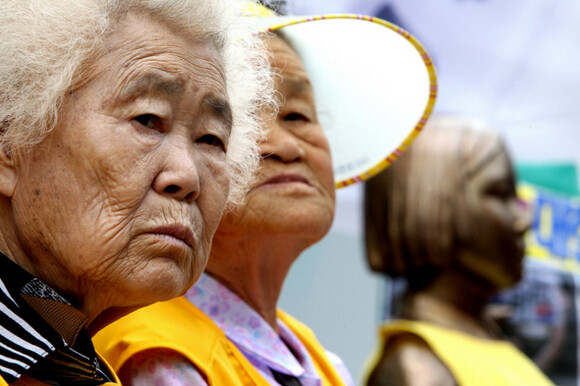hankyoreh
Links to other country sites 다른 나라 사이트 링크
Japan denying guilt of comfort women mobilizations

By Park Byong-su, staff reporter
With tensions between Korea and Japan recently flaring up over Dokdo, there has been a series of statements coming out of Japan denying the forced nature of the wartime “comfort women” mobilizations. This may be an attempt by Japan use this one issue to obscure the larger issue of the legacy of its imperial past.
Japan’s forceful mobilization of comfort women has already been recognized not only by Korea, but also the international organizations such as the UN.
The UN has released reports on the Japanese military comfort women issue for close to a decade. The best known, most systematic and most comprehensive of these reports was the “McDougall Report” released in August 1998.
“An Analysis of the Legal Liability of the Government of Japan for ‘Comfort Women Stations’ Established During the Second World War,” compiled after years of research by Gay J. McDougall, the UN Human Rights Commission’s Special Rapporteur on Systematic Rape, Sexual Slavery and Slavery-like Practices During Armed Conflict, was adopted by the UN Human Rights Commission.
In her report, McDougall wrote that the comfort women stations were fundamentally “rape centers” and that the Japanese government should study concrete measures such as paying individual compensation for acts of cruelty, and take legal action against government and military officials who were responsible for the establishment and maintenance of rape centers.
Prior to this, the UN International Commission of Jurists (UNICJ) wrote in a November 1994 report on comfort women that the Japanese military was “fully responsible for the setting up, use, operation and control of the ‘comfort stations,’” and that Japan bears “moral and legal obligation towards” the victims.
In February of 1996, UN Human Rights Commission Special Rapporteur on Violence Radhika Coomaraswamy issued her “Report on the mission to the Democratic People’s Republic of Korea, the Republic of Korea and Japan on the issue of military sexual slavery in wartime.”
In the report, compiled through on-the-ground investigations, Coomaraswamy called Japanese military comfort women “military sexual slaves” and advised Japan to acknowledge legal responsibility, provide state restitution to the victims and punish offenders.
In December 2000, women’s groups in Asia led the creation of the Women’s International War Crimes Tribunal on Japan’s Military Sexual Slavery to deal with the comfort women issue.
In a final verdict issued in December the following year, the tribunal ruled that comfort women were raped and subjected to sexual slavery, and found 10 individuals - including Emperor Hirohito - guilty of either being personally involved or being in command of those who were.
The UN Committee on the Elimination of Discrimination against Women adopted a final opinion on the comfort women issue after meetings in 1994, 2003, 2004 and 2009, calling on the Japanese government to acknowledge its responsibility and provide compensation.
The UN Committee against Torture and Committee on Civil and Political Rights also adopted opinions calling on Japan to take responsibility for the comfort women in 2007 and 2008, respectively.
The US House of Representatives adopted a resolution calling on the Japanese government to acknowledge its responsibility for the comfort women and apologize in July 2007.
This was following by similar resolutions in the Dutch (November 2007), Canadian (November 2007) and European (December 2007) parliaments.
Sungkyunkwan University professor Lee Sin-cheol said, “The trend in the international community is to judge crimes against humanity such as forced sexual slavery by an increasingly strict standard. Japan’s denials of its crimes against comfort women will lead to isolation and the collapse of its moral authority.”
Please direct questions or comments to [english@hani.co.kr]

Editorial・opinion
![[Editorial] Penalties for airing allegations against Korea’s first lady endanger free press [Editorial] Penalties for airing allegations against Korea’s first lady endanger free press](https://flexible.img.hani.co.kr/flexible/normal/500/300/imgdb/original/2024/0502/1817146398095106.jpg) [Editorial] Penalties for airing allegations against Korea’s first lady endanger free press
[Editorial] Penalties for airing allegations against Korea’s first lady endanger free press![[Editorial] Yoon must halt procurement of SM-3 interceptor missiles [Editorial] Yoon must halt procurement of SM-3 interceptor missiles](https://flexible.img.hani.co.kr/flexible/normal/500/300/imgdb/child/2024/0501/17145495551605_1717145495195344.jpg) [Editorial] Yoon must halt procurement of SM-3 interceptor missiles
[Editorial] Yoon must halt procurement of SM-3 interceptor missiles- [Guest essay] Maybe Korea’s rapid population decline is an opportunity, not a crisis
- [Column] Can Yoon steer diplomacy with Russia, China back on track?
- [Column] Season 2 of special prosecutor probe may be coming to Korea soon
- [Column] Park Geun-hye déjà vu in Yoon Suk-yeol
- [Editorial] New weight of N. Korea’s nuclear threats makes dialogue all the more urgent
- [Guest essay] The real reason Korea’s new right wants to dub Rhee a founding father
- [Column] ‘Choson’: Is it time we start referring to N. Korea in its own terms?
- [Editorial] Japan’s rewriting of history with Korea has gone too far
Most viewed articles
- 160% of young Koreans see no need to have kids after marriage
- 2Presidential office warns of veto in response to opposition passing special counsel probe act
- 3[Editorial] Penalties for airing allegations against Korea’s first lady endanger free press
- 4[Editorial] Japan’s rewriting of history with Korea has gone too far
- 5[Column] Park Geun-hye déjà vu in Yoon Suk-yeol
- 6For survivor, Jeju April 3 massacre is a living reality, not dead history
- 7[Guest essay] Maybe Korea’s rapid population decline is an opportunity, not a crisis
- 8[Special Feature Series: April 3 Jeju Uprising, Part III] US culpability for the bloodshed on Jeju I
- 9[Column] America must frankly own up to role in tragic Jeju April 3 Incident
- 10‘My mission is suppression’: Jeju blood on the hands of the US military government